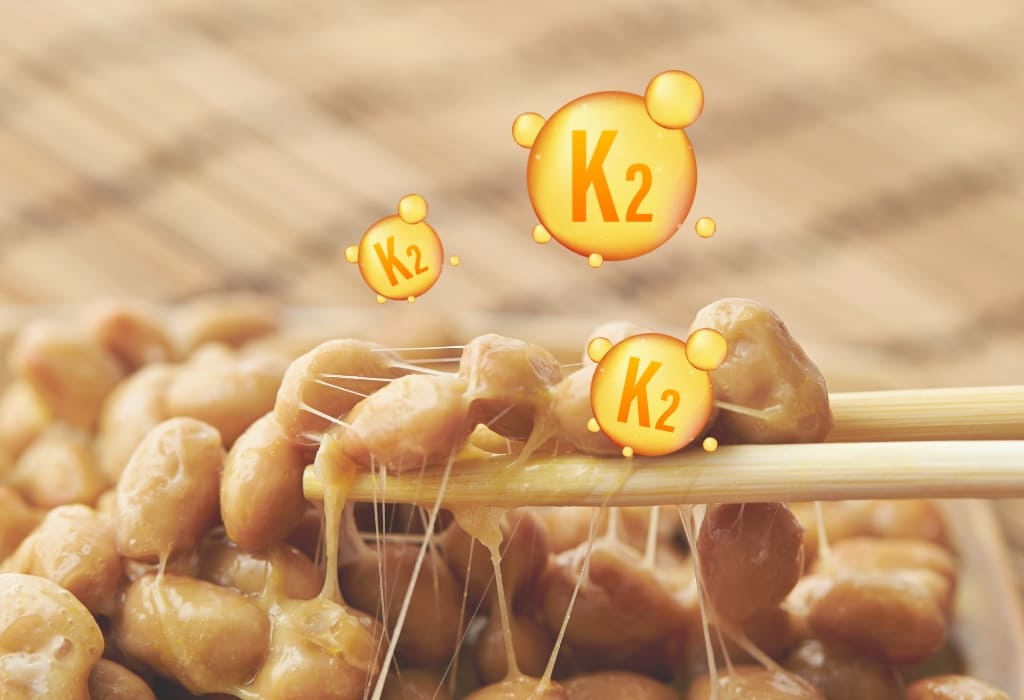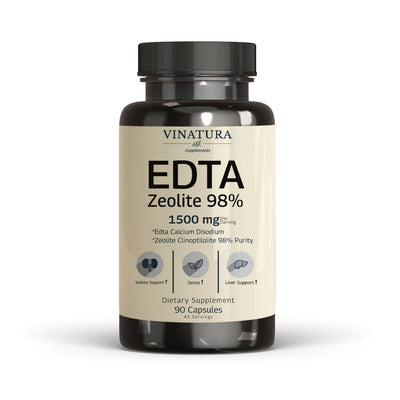
Nattokinase & Vitamin K2: Why Is Vitamin K2 Removed from Nattokinase?
Nattokinase and Vitamin K2 are essential substances in Natto, a traditional Japanese food known for its health benefits. While they come from the same source, they have distinct functions and effects on health. In this article, we'll explore the relationship between Nattokinase and Vitamin K2, discussing their differences, the removal of Vitamin K2 from Nattokinase, their content in Natto, and dietary considerations and potential interactions with other supplements. This content will provide a comprehensive understanding of Nattokinase and Vitamin K2 to make informed choices about their use.
Before exploring further, please read the disclaimer located at the end of this webpage.
Key Takeaways
- Nattokinase and Vitamin K, specifically Vitamin K2, are two components found in Natto—a traditional Japanese food made from fermented soybeans.
- Nattokinase does not contain Vitamin K2.
- Vitamin K2 is removed from Nattokinase due to their different mechanisms of action concerning blood clotting.
- Natto contains over 880 mg of Vitamin K2 per 100g.
- It is possible to use Nattokinase and Vitamin K2 supplements, but dosage should be carefully considered to avoid the potential effect of increasing estrogen levels.
Is Nattokinase The Same As Vitamin K2?
Nattokinase and Vitamin K2 are not the same, even though both come from Natto. They each have distinct roles and benefits for human health.
Nattokinase is a powerful enzyme produced during the fermentation of Natto. It is recognized for its ability to dissolve blood clots, regulate lipid levels and also, Nattokinase reduce the risk of heart disease and arterial plaque [1], [3].
In contrast, Vitamin K2, specifically the Menaquinone-7 (MK-7) form found in high amounts in Natto, is crucial for blood clotting and maintaining bone health. It may also help prevent osteoporosis [4].
Although both are derived from the same food, they serve different functions in the body that work together to promote overall health.
The Relationship Of Vitamin K2 And Nattokinase
Nattokinase and vitamin K2 both originate from natto and contribute to blood health, but they play different roles. Nattokinase is an enzyme that supports healthy blood flow by breaking down fibrin, a protein involved in blood clotting. This helps maintain proper circulation and can also promote heart health. Additionally, nattokinase supports a healthy inflammatory response and protects against oxidative stress.
Vitamin K2, particularly in the MK-7 form found in natto, helps regulate calcium in the body by directing it to bones and teeth and preventing its buildup in blood vessels. This regulation is essential for maintaining healthy blood flow and cardiovascular health.
While nattokinase supplements can provide significant benefits, they might not contain vitamin K2. For optimal health benefits, check the supplement label to ensure it includes both nattokinase and vitamin K2.

Why Is Vitamin K2 Removed From Nattokinase?
Although both Vitamin K2 and Nattokinase come from Natto and support blood health, Vitamin K2 is usually removed from Nattokinase supplements due to their opposing effects on blood clotting.
Vitamin K2 helps with clot formation, which is necessary to prevent excessive bleeding from injuries. On the other hand, Nattokinase can dissolve existing blood clots, improving blood flow and potentially reducing the risk of heart issues.
Combining both in a single supplement could cancel out their effects, causing confusion in the body's clotting process. As a result, Vitamin K2 is often excluded from Nattokinase supplements to maintain their effectiveness.
Does Nattokinase Contain Vitamin K2?
Nattokinase supplements do not contain Vitamin K2. Although both Nattokinase and Vitamin K2 are naturally found in Natto and other products fermented with B. subtilis [2], they are separated during the manufacturing of Nattokinase supplements.
This separation is done to avoid their opposing effects on blood clotting. However, if you eat Natto directly, you will consume both Nattokinase and Vitamin K2. It's important to note that the amount of Vitamin K2 can vary in different Natto products, so it's a good idea to check the nutritional label if you are specifically looking for this vitamin.
How Much Vitamin K2 Is In Natto?
It has been reported that Natto contains over 880 mg of Vitamin K2 per 100g [4]. This remarkable concentration makes Natto an excellent choice for individuals seeking to enhance their Vitamin K2 intake. However, the actual Vitamin K2 content may vary due to factors such as the fermentation process
Can I Take Vitamin K2 With Nattokinase?
Yes, you can take nattokinase supplements and Vitamin K2 together, but it's important to understand their individual roles and potential interactions. Nattokinase helps break down blood clots and improve blood circulation, while Vitamin K2 supports blood clotting and prevents excessive bleeding. Combining these two could potentially affect your body’s natural blood clotting processes.
Taking Nattokinase and Vitamin K2 separately as supplements is different from consuming Natto. There are concerns that this combination might influence estrogen levels, though current research mainly focuses on unprocessed soybeans and is not definitive regarding its effects on hormones like estrogen and testosterone. The controversy primarily centers on the isoflavones in soy [5].
In summary, while there is no clear evidence that taking nattokinase and Vitamin K2 together significantly impacts hormones, it's important to consider the specific form of soy products you consume and how they might interact with your supplements.
What Supplements Should Not Be Taken With Nattokinase?
While no formal research exists on which supplements should not be taken with Nattokinase, it's essential to exercise caution based on user feedback and known interactions. Certain supplements such as aspirin, ginkgo and some cardiovascular drugs may interact with Nattokinase due to their effects on blood clotting.
Keep in mind that these are general suggestions, and interactions may vary. It's always wise to get advice from a healthcare professional before starting any new supplement.

What Should Vitamin K2 Not Be Taken With?
Caution should be exercised when using Vitamin K2 with certain medications, as they may interfere with its effectiveness. The medicines include antacids, blood thinners, antibiotics, aspirin, and drugs prescribed for cancer, seizures, high cholesterol, and various other conditions.
Conclusion
Nattokinase and Vitamin K2 found in Natto play unique and crucial roles in our health. While they originate from the same source, their functions differ significantly, leading to their separation in dietary supplements. This separation ensures that each can function without interfering with the other. When considering these supplements, it's essential to consider individual health conditions and potential interactions and always seek advice from a healthcare professional.
You may also like:
- 7 Best Nattokinase Supplements for Cardiovascular Health
- Can You Take NAC Nattokinase and Bromelain Together?
- How Much Nattokinase Per Day Should You Take?
References
- [1] Gasmi, A., Bjørklund, G., Peana, M., Mujawdiya, P. K., Pivina, L., Ongenae, A., Piscopo, S., & Severin, B. (2021). Phosphocalcic metabolism and the role of vitamin D, vitamin K2, and nattokinase supplementation. Critical Reviews in Food Science and Nutrition, 62(25), 7062–7071. https://doi.org/10.1080/10408398.2021.1910481
- [2] Wang, H., Liu, H., Wang, L., Zhao, G., Tang, H., Sun, X., Ni, W., Yang, Q., Wang, P., & Zheng, Z. (2019). Improvement of menaquinone-7 production by Bacillus subtilis natto in a novel residue-free medium by increasing the redox potential. Applied Microbiology and Biotechnology, 103(18), 7519–7535. https://doi.org/10.1007/s00253-019-10044-5
- [3] Xu, B., Xu, B., Provincial People's Hospital, S., Guo, C., & Lin, Y. (2022).
- [4] Yanagisawa, Y., & Sumi, H. (2005). Natto Bacillus Contains A Large Amount Of Water-Soluble Vitamin K (Menaquinone-7). Journal of Food Biochemistry, 29(3), 267–277. https://doi.org/10.1111/j.1745-4514.2005.00016.x
- [5] Straight Talk About Soy. (2018, August 6). The Nutrition Source. https://nutritionsource.hsph.harvard.edu/soy/
Author

Product Disclaimer
The dietary supplement products mentioned on this website are formulated based on scientific research and adhere to FDA guidelines for dietary supplements. However, the content of the articles has not been evaluated by the Food and Drug Administration (FDA) and is not intended to promote or endorse any specific product. Any products sold on this website are not intended to diagnose, treat, cure, or prevent any disease.
Opinions and Endorsements
Any claims, statements, or opinions expressed in the articles are those of the author(s) and do not necessarily reflect the views or opinions of the manufacturers of the dietary supplement products. The products sold on this website are separate from the content of the articles and are not directly endorsed or associated with the information presented here.
Liability Disclaimer
The author(s) of the articles, website, and manufacturers of the dietary supplement products do not assume any liability for any potential consequences arising from the use of the information provided in the articles. It is recommended that individuals consult with a qualified healthcare professional before making any dietary or lifestyle changes, including the use of dietary supplements.
Product Usage
Please refer to the product labels and packaging for specific usage instructions and guidelines for the dietary supplement products sold on this website.
Customer Support
For any concerns or questions regarding the dietary supplement products, please contact our customer support team, who will be more than happy to assist you.





Leave a Comment
Be the first to comment.
What do you think?